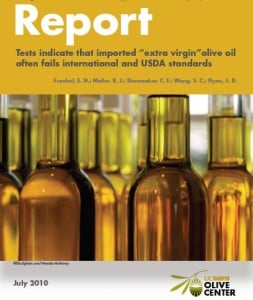Lawsuit Targets Olive Oil Brands Denounced in Davis Study
Several California chefs and restaurateurs, including a former “Top Chef” contestant, are suing 10 major olive oil brands and retailers after a study by the UC Davis Olive Center found that most extra virgin olive oils did not meet classification criteria. The lawsuit alleges that the defendants have been misleading consumers by marketing substandard olive oil as extra-virgin, seeking an injunction to prevent distribution and potentially hundreds of millions of dollars in restitution for fraudulently obtained profits.
By Alex Beekman
Several California chefs and restaurateurs are suing certain retailers and distributors of 10 major olive oil brands after the UC Davis Olive Center released a study last month that concluded most extra virgin olive oils sampled did not meet criteria for extra virgin classification. The plaintiffs include a contestant from the Bravo network’s “Top Chef” TV show, David Martin, and several prominent Southern California restaurant owners.
The lawsuit, which seeks class action status, names 10 major olive oil brands, including Bertolli, Filippo Berio, Carapelli, Star, Colavita, Mezzetta, Pompeian, Rachael Ray, Mazolla and Safeway Select.

- Daniel J. Callahan

It also names 10 major supermarket chains and big box stores that allegedly marketed substandard oil under the extra-virgin banner, based on covert testing done by the plaintiff’s law firm, Callahan & Blaine in Santa Ana, Calif.
The lawsuit alleges that many olive oils are mislabeled so the costs can be marked up for consumers. “The results of the tests were shocking,” the lawsuit states. “Sensory tests showed that these failed samples had defective flavors such as rancid, fusty and musty.”
According to Daniel J. Callahan of Callahan & Blaine in Santa Ana, lead counsel for the plaintiffs, “The Defendants, olive oil manufacturers, distributors and retailers who sell their product in the State of California, have been knowingly misleading and defrauding California consumers for years. Defendants have been claiming the olive oil they sell meets the high standard of the extra virgin classification, thus entitling Defendants to charge a hefty premium for the product, when in fact the product does not meet that standard and is of inferior quality often adulterated with cheaper refined oils such as hazelnut oil or lesser olive oils.”
 A statement by the law firm continued: “These misrepresentations have been proven false in a comprehensive study by the UC Davis Olive Center at the Robert Mondavi Institute for Wine and Food Science at the University of California, Davis in its July 2010 Report. The Report is authored by the leading Ph.D.s, researchers and scientists in the nation on edible oil research and education. Cooperating and contributing to the funding, research and findings in this study were the California Olive Oil Council, the American Oil Chemists’ Society (AOCS) and the Australian Olive Oil Association.”
A statement by the law firm continued: “These misrepresentations have been proven false in a comprehensive study by the UC Davis Olive Center at the Robert Mondavi Institute for Wine and Food Science at the University of California, Davis in its July 2010 Report. The Report is authored by the leading Ph.D.s, researchers and scientists in the nation on edible oil research and education. Cooperating and contributing to the funding, research and findings in this study were the California Olive Oil Council, the American Oil Chemists’ Society (AOCS) and the Australian Olive Oil Association.”
Plaintiffs are seeking an injunction preventing the questionable oil from being distributed and may also request hundreds of millions of dollars in restitution for “fraudulently obtained profits,” Callahan said, estimating that, with so many defendants, the case will take perhaps two years before it makes it into court.
Allegations of adulterated olive oil and olive oil fraud are not new in the U.S. where for a long time European olive oil exporters have been taking advantage of American naïveté and an absence of quality standards.
The lawsuit is the latest development in the unfolding aftermath of the UC
Davis study which was financed, in part, by olive oil producers in California.

